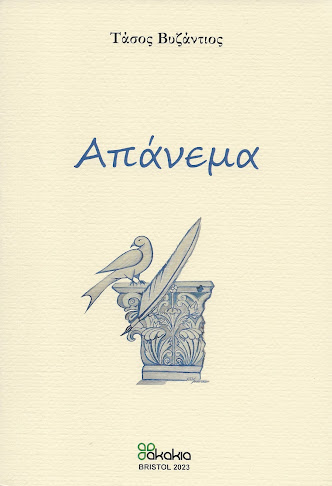Ένα νέο βιβλίο κυκλοφόρησε πρόσφατα (τον Δεκέμβριο 2009), αφιερωμένο στους Έλληνες Ποιητές από τον Όμηρο μέχρι σήμερα (The Greek Poets: Homer to the Present). Συντάκτες της σημαντικής αυτής έκδοσης είναι οι εξής: Peter Constantine, Rachel Hadas, Edmund Keeley και η Karen Van Dyck. Τον τόμο (με σκληρό εξώφυλλο) των 736 σελίδων προλογίζει ο Robert Hass. Το ISBN είναι: 978-0-393-06083-6.
Ο τόμος αυτός θεωρείται ήδη από τους κριτικούς ως ένα «modern classic», αφού παρουσιάζει, σε εξαιρετική μετάφραση στα αγγλικά, με γλαφυρό αλλά και συστηματικό τρόπο, 3.000 χρόνια Ελληνικής Ποίησης. Περισσότερα από 1000 ποιήματα και 200 Ποιητές παρελαύνουν από τις σελίδες του. Από τα έπη του Ομήρου μέχρι τις ιστορικές και ερωτικές ειρωνείες του Καβάφη, κι από τους ύμνους του Βυζαντίου μέχρι τις καινοτόμες φωνές του 20ου αιώνα, αυτή η ανθολογία συνοψίζει τις διαφορετικές τάσεις της Ελληνικής Ποιητικής Παράδοσης.
Η έκδοση αυτή βρήκε θετικότατη ανταπόκριση από τους κριτικούς και το κοινό στις Αγγλοσαξωνικές χώρες και όχι μόνο. Έτσι, διαβάζουμε στην έγκριτη αγγλική εφημερίδα The Guardian, της 10ης Απριλίου τ.έ., πολύ κολακευτικά λόγια, γραμμένα από τον Jay Parini. Ιδού μερικά απ’ αυτά:
- In a sense the Greeks invented poetry, as the term itself has a Greek derivation, and so many essential forms -epic, lyric, elegy, ode- were Greek inventions.
- The primary impulse of the Greeks was poetic: they admired its concision, its music, its rhythmical thrust. They adored metaphor, with its juxtapositions and dislocations. Indeed, metaphor itself, often in the form of simile, is the glory of Homer, who spins similitudes with abandon.
- The wise practice of this anthology is to mix translators, so one hears various shades of the original.
- The first of four sections of this anthology deals with classical antiquity and, as expected, the best of Greek poetry will be found there.
- ...the splendid poetry of Dionysios Solomos.
- The 20th century marks, for the Greeks, a return to poetic grandeur.
- The Greek Poets has convinced me that there is something in the Greek light and landscape, perhaps within the language itself, that engenders poetry, and that the lyric impulse has remained alive on this significant soil for a very long time.
- The primary impulse of the Greeks was poetic: they admired its concision, its music, its rhythmical thrust. They adored metaphor, with its juxtapositions and dislocations. Indeed, metaphor itself, often in the form of simile, is the glory of Homer, who spins similitudes with abandon.
- The wise practice of this anthology is to mix translators, so one hears various shades of the original.
- The first of four sections of this anthology deals with classical antiquity and, as expected, the best of Greek poetry will be found there.
- ...the splendid poetry of Dionysios Solomos.
- The 20th century marks, for the Greeks, a return to poetic grandeur.
- The Greek Poets has convinced me that there is something in the Greek light and landscape, perhaps within the language itself, that engenders poetry, and that the lyric impulse has remained alive on this significant soil for a very long time.













































4 comments:
Μια έκδοση άξια προσοχής και απόκτησης! Μακάρι να ταξιδεύει και να διαδίδεται ο Έλλην Λόγος!!!
Λόγος Ανέστη!!!
Ευτυχώς που υπάρχει και η τέχνη!
Ευτυχώς!
καλημέρα
@ Π.Κ.,
Είμαι σίγουρος ότι θα χάρηκες και από την κολακευτική αναφορά στον τοπικό σου Άγιο της Ποίησης: "...the splendid poetry of Dionysios Solomos".
Όντως Ανέστη!
@ logia,
H τέχνη αποτελεί πάντα σε καιρούς χαλεπούς -όπως οι σημερινοί- την πραγματική σανίδα σωτηρίας.
Απώλειες προφανώς θα έχουμε. Αλλά μέσω αυτής κάποιοι θα σωθούν. Κι αυτό είναι ελπιδοφόρο.
Post a Comment